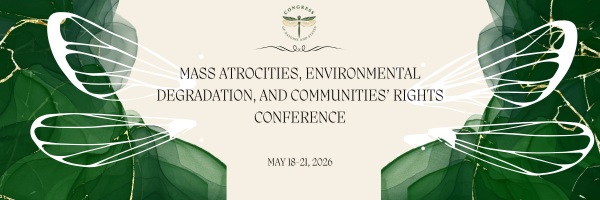

Mass Atrocities, Environmental Degradation, and Communities’ Rights: Lived Experiences from the Peripheries
Mon, 18 May 2026 - Thu, 21 May 2026
Dundee, Royaume-Uni
In today’s complex and dynamic global landscape, many pertinent issues compete for public space and attention, many of which are enormously difficult to resolve and have a tremendous impact on the lives of millions of people. International crimes, mass atrocities, environmental degradation, and gross human rights violations unfolding across many communities do not receive the necessary visibility as other issues like the ongoing climate crisis that affects human and natural worlds alike. However, all these issues are related. The climate crisis is often a result of historical or current injustices, sometimes at a systemic level, experienced by communities that are marginalized socially, economically, or politically. These communities also tend to be the worst affected by many public policies that seek to address the crisis. They are often excluded from the decision-making processes that affect their lives and their worldviews are silenced, misrepresented or devalued. Their traditional knowledge systems are erased and their cultures are assimilated to fit dominant modes of thinking and being. The climate crisis thus becomes the outcome and the catalyst for systemic injustices of global and local importance, such as mass atrocities, environmental degradation, and gross human rights violations.
The Congress of Nations and States (CNS), the Dundee Just Transition Hub, and the University of Stirling would like to invite you to participate in the interdisciplinary conference “Mass Atrocities, Environmental Degradation, and Communities’ Rights”, which will take place from 18-21 May 2026 in Dundee, Scotland. The event will be integrated into the biennial CNS Assembly which will bring together indigenous and minority communities from all over the world to discuss issues relating to mass atrocities, environmental degradation and communities’ rights.
We welcome submissions on topics that intersect with the theme of the conference, including but not limited to:
- Mass atrocities: prevention; perpetration and impunity; intersections with environmental degradation; intersections with climate change; trauma, grief, and memory; Reparations, mitigation, adaptation, and loss and damage;
- Indigenous peoples and minority groups: self-determination; indigenous and traditional knowledges and alternative futures; indigenous and traditional responses to atrocities, environmental degradation and climate change; transitions to net zero including for example, energy transitions, transitions to circular economies, transitions in food production and farming, transition in transports and in the built environment; reparations, mitigation, adaptation, and loss and damage; the meanings of clean energy; the different meanings of just transitions;
- Environmental degradation: environmental violations; ecocide; traditional ecological knowledge; ecological, environmental, climate and social justice: synergies and clashes; water protection, water policies and water rights; free, prior and informed consent; rights of nature.
Proposals can be submitted in the following formats: Papers, Performance, Displays, Literary Works, and Artistic Work.
For papers, a 200-word abstract is required.
For all other proposals, a 100-word summary OR a two-minute video explaining the performance/artwork/or display will be required.
The last date to submit a proposal for this conference is 15 October 2025 at 12 pm midnight (ET).
Please submit your proposal using the form https://forms.office.com/e/itSFjTuWKB











